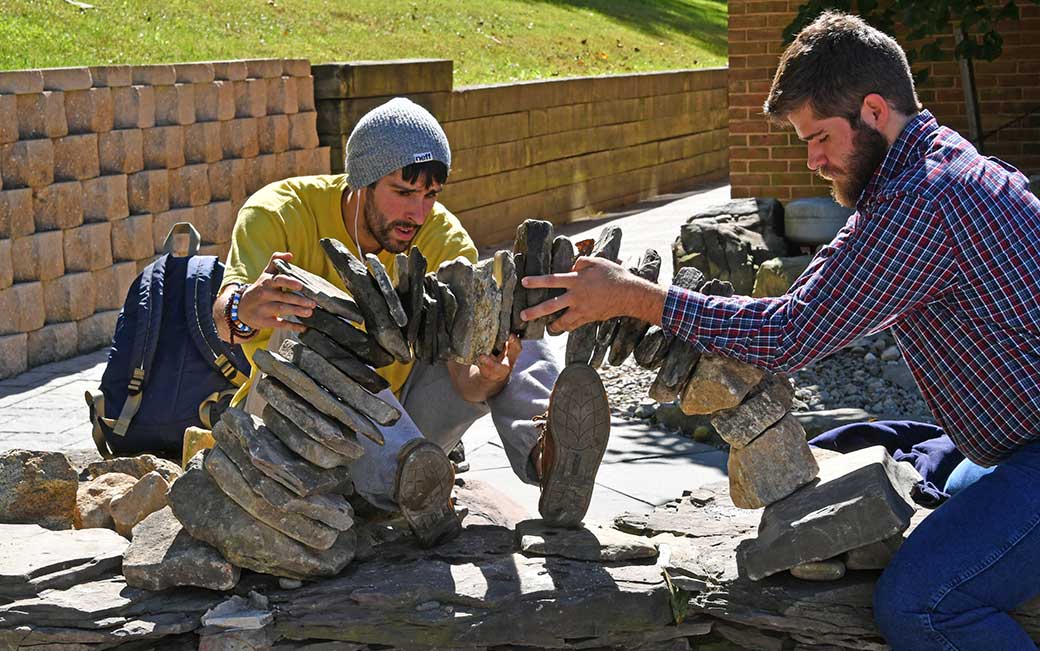Finding balance: stress management tips and techniques at Towson University
Anxiety, depression, stress and academics are among the most common reasons for seeking counseling services among TU students.
By Megan Bradshaw on October 24, 2016

Anxiety, depression, stress and academics are among the most common reasons for seeking counseling services among TU students. In the past year, approximately 10 percent of the Towson University student population sought counseling services at the Counseling Center—a total that doesn’t include students who attended outreach events and programming.
While anecdotally it is common to see an increase of student utilization of the center’s services around stressful times of the semester—moving-in/returning to campus, midterms, and finals—more notable is the overall trend both at Towson University’s Counseling Center and throughout the country in the rising demand for counseling services. At TU alone, there has been a 37 percent increase from 2014-2016 in the number of students served at the Counseling Center.
Counseling Center services
In addition to one-on-one counseling, the center offers group therapy programs, mindfulness meditation training, workshops and wellness-related events throughout the year. There are also programming and events outside of the Counseling Center.
The center’s peer education programs (TAPP, BIPE, SAPE, and Healthy Minds) are also dedicated to providing programming events and resources about student wellness to the campus community. TU offers students opportunities to join and be supported by various campus services such as the Academic Achievement Center, Disability Support Services and the Center for Student Diversity.
In addition, a large number of student organizations, campus communities, and affinity groups provide support and a feeling of belonging, especially for students who have special interests or culturally are not in the majority. For example, Towson Hillel, The Muslim Student Association, Black Student Union, fraternities and sororities, and many other student organizations are supportive, as is reaching out to an individual mentor or adviser on campus.
“I think a common challenge for students is thinking that they do not have time for stress management techniques. I think it is important to reminder that self-care and stress management techniques do not need to require a lot of time or commitment, even just a few brief moments for self-care can pay dividends,” said Leigh Ann Carter, PsyD, a staff psychologist and coordinator of anxiety and depression services at TU’s Counseling Center.
See a full list of the Counseling Center’s resources (by topic)
Students’ own solutions
Like many things in life, stress management techniques are not a one-size-fits-all experience. What may be helpful for one student, may not work for another. But what this also means is that stress management techniques are really only limited by our own imaginations.
The Towerlight recently featured senior early education major Tyler Bohn, who is TU’s resident cairn builder (photographed above left). As the student newspaper notes, “he began practicing the art two years ago, after a co-worker at Trader Joe’s told him about the cairn culture in Ellicott City … for Bohn, the art form serves as a kind of meditation. He doesn’t think about anything while he’s stacking, aside from how he’ll perfectly line up his tripods, which are the large indentations in some rocks that allow others to stand upright.”
The Towerlight article goes on to say, “Bohn says that rock balancing helps him focus and get through the day, which is essential when his days consist of eight or nine hours of homework. He enjoys getting outside and seeing people’s reactions.”
Senior graphic design major Ali Requa turns to YouTube.
"One good ole reliable way that I deal with stress is to forget that time exists for a few minutes and browse through uplifting, cute or funny videos,” she said. “The main cause of my stress is the fact that my brain is constantly running 110 miles per hour. I’ve filled my time with work, school, and even more work after that. It’s easy to forget how much pressure you put on yourself sometimes.
“So sometimes when I realize I need a break, I pull out my phone for a stretch of uninterrupted happy videos. This is one of my roll-on-the-floor-laughing videos that always does the trick. 'Lincoln on a bear,' enough said."
basic self-care strategies
Common self-care strategies everyone can use:
- Adequate sleep
- Proper nutrition
- Exercise
- Social support
- Mindfulness apps
- Volunteering
- Visiting an animal shelter